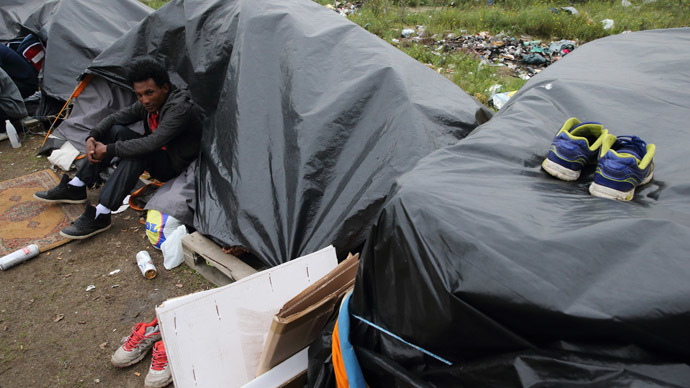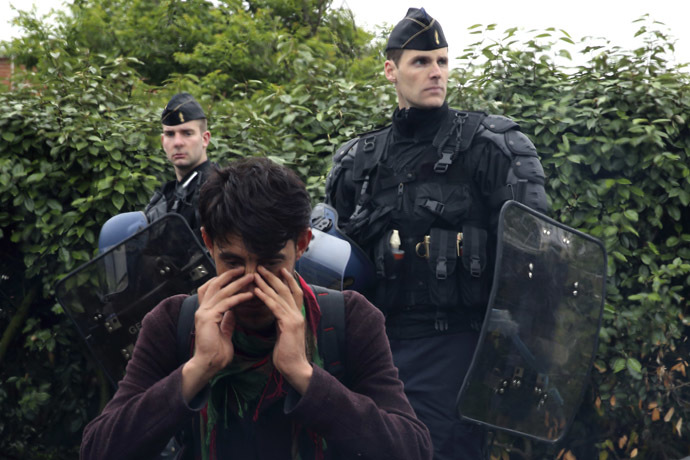Where is the ‘Coalition of the Willing’ when it comes to refugees?

European governments are willing to bomb the Middle East but there is no “coalition of the willing” to help refugees and the victims of these wars.
Thousands of Kurdish Syrians, Tunisians, Libyans, Iraqis and others from the Middle East and North Africa are seeking refuge from war and economic crisis. Last year, an estimated 15,000 refugees entered the EU via the Bulgarian-Turkish border while 4,200 undocumented migrants crossed into Spain via Morocco. According to Germany’s Federal Agency for Migration and Refugees (BAMF) requests for asylum are at their highest since 1999, with more than 127,000 requests. This is Europe’s untold crisis.
European countries have always been quick to join the US’s “coalition of the willing.” This coalition has been responsible for four million Iraqi refugees over the last decade, as Seamus Milne points out. Eleven years and two failed wars later, the US can still count on more than 40 countries to support its bombing campaign against the Islamic State. While Britain and France conduct air strikes, Germany decided to arm the Kurdish Peshmerga fighters in early September. These same countries have been slow to react to the imploding refugee crisis, if at all.
This summer I witnessed the refugee crisis in Calais in northern France first hand when travelling from London to Cologne, Germany by car. I had seen nothing like it before. As we left the car ferry and drove through the barb-wired high security fenced areas of Calais port, hundreds of African, Arab and Asian men lined up on both sides of the streets. Some lay in the trenches at the side of the road in war-mode. Looking into their faces you could see their hopelessness. Fatigue had overwhelmed their willpower. Here they were, walking up toward a bridge that I only had known from activists’ recollections. They would use their one chance to jump onto the roof of a passing truck to go unnoticed. Most of them would fail and get hit. Others would crash and die.
As if the high-security fences surrounding Calais port were not intimidating enough, police officers were out to crush the refugees on that day. They had brought trucks and cars to a halt, forming a mile long queue outside the port area. French police were chasing some of the migrants down a hill, while cops on motorbikes blocked off the main road where a group of two dozen had assembled. This resembled the television pictures of thousands refugees at the fence between Morocco and Melilla, Spain on the northern tip of Africa, where over 400 refugees broke through the fence earlier this year.
An estimated 23,000 migrants have died at Europe’s borders over the years. According to the UN, over 3,000 asylum seekers died crossing the Mediterranean Sea this year alone. Mainstream rhetoric might have changed a year after over 360 migrants drowned in a shipwreck just a mile from the southern Italian island of Lampedusa. The EU’s policies home and abroad remain much the same.

The European border agency's annual budget has skyrocketed from roughly €6 million in 2005 to almost €90 million today. Yet, the securitization of Europe’s borders has not solved any problems whatsoever. Instead it has exacerbated them, making the passage into Europe more dangerous than ever. This has gone hand in hand with EU member states reducing their spending on rescue missions. Maximillian Popp writes in Der Spiegel International: “Italy has also announced that it will end its rescue operations, which cost the country €9 million ($11.7 million) a month, saying it wants Frontex to take over. A division of the border agency called Frontex Plus will now assume at least a portion of the Italians' duties, although funding remains unclear.”
The EU leaves its border-states such as Bulgaria, Greece or Italy to fend for themselves. There is no sign of a “coalition of the willing.” Instead, the Dublin II regulations state that refugees must remain in the country and even the city where they have their passport stamped. This bars them from travelling to countries such as Germany, Britain or France. The restrictions also mean that they are barred from work and from learning the language.
The journalist and author Daniel Trilling writes about the situation of Syrian refugees in Bulgaria: “Thousands more refugees don't even have savings to fall back on; many of them have stayed in the camps, saying they have nowhere else to go. Conditions have improved since the winter - families are living indoors rather than in tents; there are basic utilities and a daily hot meal - but life remains tough.”
In Germany - the wealthiest country of the European Union - the situation is no better. Refugees reside in abandoned schools, tents, and run-down flats. Tent cities which resemble Occupy camps have become sites of protest and living. More than 200 refugees were living at Berlin’s Oranienplatz since 2012 until they were evicted. In Hannover, Sudanese refugees live on a campsite as well. Banners hung between trees condemn the collaboration between the German and Sudanese government.
Too frequent, these refugees fall victim to police repression and violent attacks by right-wing gangs. Last week, a leaked video revealed how private security guards in an asylum seekers’ home in the federal state of North-Rhine Westphalia beat up refugees and forced them to lay in their own vomit. The police was well aware of this abuse, and the fact that private security labeled themselves “SS Troops”.
But refugees cannot even count on those who are supposed to stand by their side. After the service union trade union Verdi in Hamburg granted membership to 300 refugees threatened with deportation, refugees demanded membership in the German trade union confederation DGB. Last Friday, 200 “robocops” violently cleared the DGB house which refugees had occupied in Berlin-Brandenburg. Two refugees were injured. The words “solidarity” and “justice” which adorn the house seemingly do not mean much these days. In its press statement, the DGB stated that the occupation hindered them from fulfilling their political duties - helping refugees is not regarded part of that work.
Refugees are the real losers of Europe’s policies at home and abroad. The EU’s talk of humanitarianism, citizenship and democracy ends when it comes to refugees. We seriously have to ask ourselves: Where is the coalition of the willing?
The statements, views and opinions expressed in this column are solely those of the author and do not necessarily represent those of RT.
The statements, views and opinions expressed in this column are solely those of the author and do not necessarily represent those of RT.













